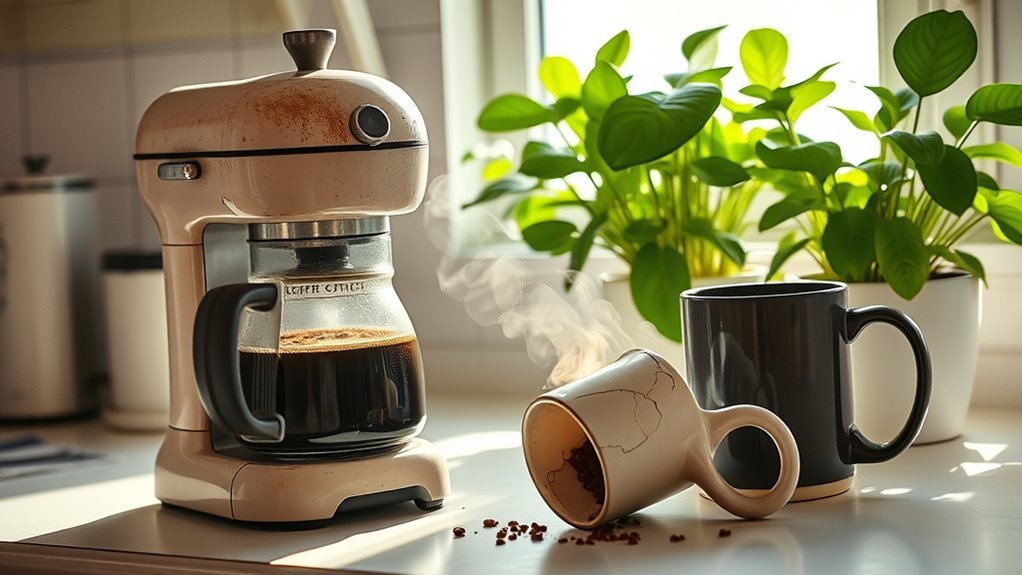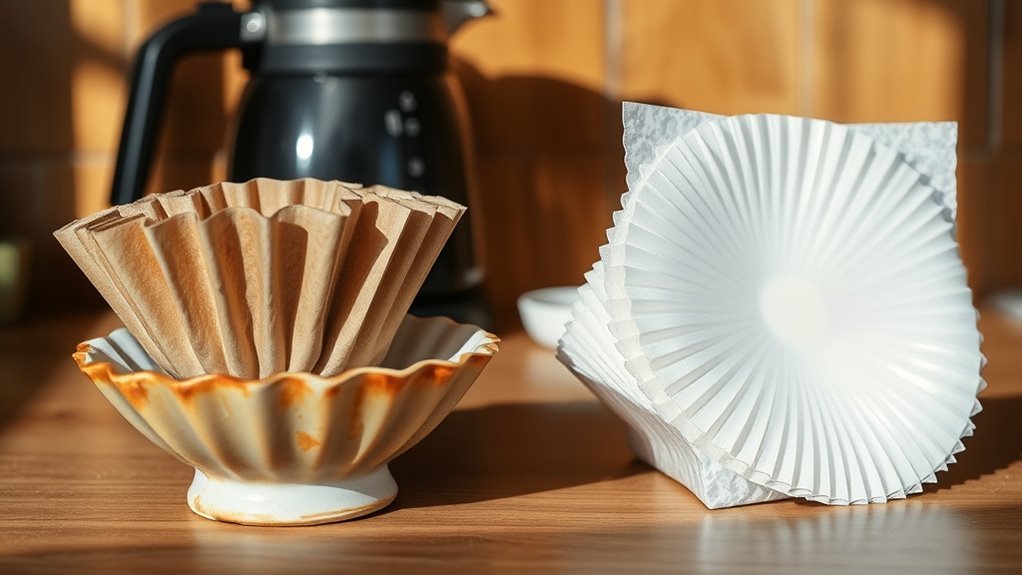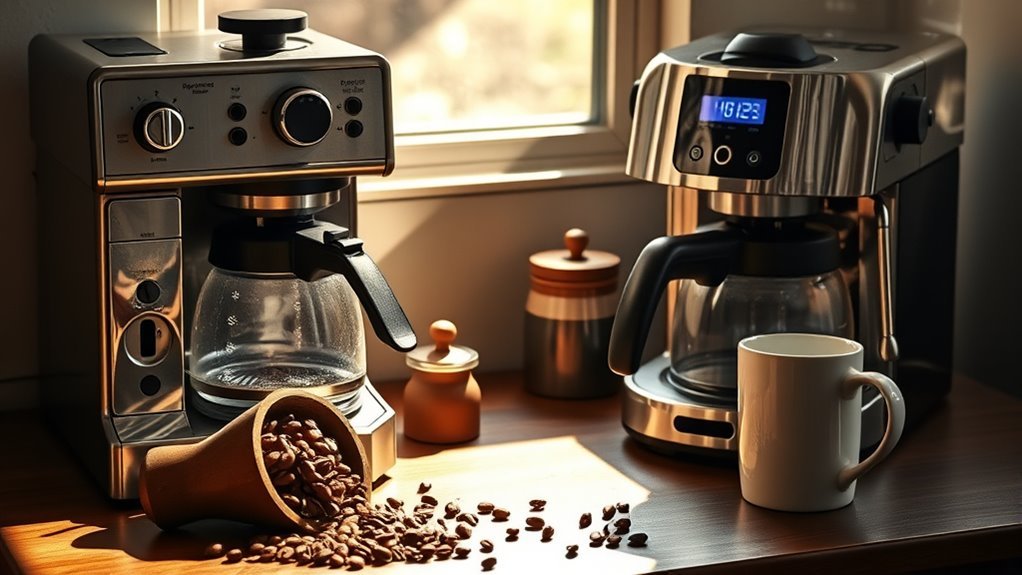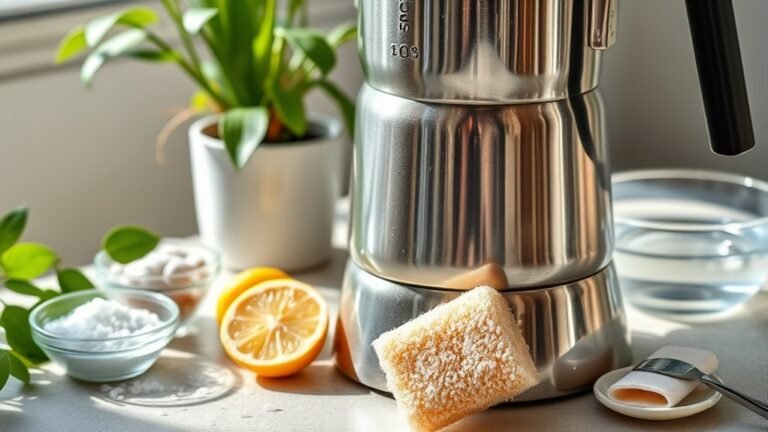When to Replace Your Coffee Equipment
Recognizing when to replace your coffee equipment is essential for maintaining quality. If your coffee maker brews slowly, leaks, or the flavor isn’t what it used to be, it may be time for an upgrade. Keep an eye on your grinder; if it produces inconsistent grinds, it’s time for a swap. Also, inspect filters for discoloration or clogging. Finally, worn accessories can diminish your coffee’s flavor. There’s much more to take into account for ideal brewing performance.
Signs Your Coffee Maker Is Past Its Prime

As your coffee maker ages, you might notice subtle signs indicating it’s time for an upgrade. The typical coffee maker lifespan is around five to ten years, but various factors can influence this. If you begin to experience a brewing performance decline—like slower brewing times or inconsistent temperatures—it’s a clear warning sign. You may also notice a build-up of residue despite regular cleaning, which can affect flavor. Additionally, if the machine leaks or emits strange noises, these are definite red flags. When your coffee no longer tastes as rich or aromatic, it’s time for a change. By recognizing these signs early, you can guarantee you continue enjoying your morning brew without compromise.
The Importance of Fresh Coffee Grinders
While many coffee enthusiasts focus solely on their brewing equipment, the importance of fresh coffee grinders cannot be overstated. A quality grinder doesn’t just chop beans; it plays a vital role in preserving coffee freshness. When you grind your beans, you expose them to oxygen, which accelerates staleness. That’s why grinder maintenance is key—keeping your grinder clean prevents old coffee residues from tainting new grounds. Regularly check your burrs for wear and verify they’re properly aligned to achieve a consistent grind size. This precision helps extract peak flavors during brewing. By investing time in your grinder, you’re safeguarding the integrity of your coffee, ultimately enhancing your daily brew and making sure each cup is as fresh as possible.
When to Replace Your Coffee Filters

How can you tell when it’s time to replace your coffee filters? It’s crucial to monitor filter longevity for peak brew quality. If you notice a decline in flavor or an increase in sediment in your cup, it’s a sign your filters might be compromised. Over time, filters can become clogged with oils and coffee particles, affecting the extraction process. If you’re using reusable filters, inspect them regularly for discoloration or physical damage; these are indicators they’re past their prime. For disposable filters, even subtle changes in taste or aroma can signal that it’s time for a fresh batch. Prioritizing high-quality filters will guarantee each cup of coffee remains a liberating experience, free of unwanted flavors.
Recognizing Wear and Tear on Accessories
When you’re brewing your daily cup, it’s easy to overlook the wear and tear on your coffee accessories, yet recognizing these signs is vital for maintaining peak performance. Start by inspecting parts like your grinder burrs, which can become dull over time, leading to inconsistent grind sizes. Check your tamper for any cracks or chips; worn parts can affect extraction. If your carafe has scratches or discoloration, it might retain flavors and odors, impacting your brew. Regularly cleaning your equipment can help, but don’t ignore these warning signs. Maintenance tips include replacing any damaged components promptly to guarantee your coffee remains fresh and flavorful. Staying aware of these details will enhance your brewing experience and extend the life of your accessories.
Upgrading Your Coffee Gear for Better Flavor

If you’re serious about enhancing the flavor of your coffee, upgrading your gear can make a significant difference. Investing in high-quality espresso machines and refining your brewing techniques can elevate your coffee experience. Newer machines often feature advanced temperature control and pressure consistency, both critical for extracting rich flavors.
| Gear Upgrade | Benefit |
|---|---|
| Espresso Machines | Better extraction and crema |
| Burr Grinders | Uniform grind size for flavor |
| French Press | Full-bodied taste profile |
| Pour-Over Kit | Precision in brewing technique |
| Temperature Control | Consistent brew temperature |
Frequently Asked Questions
How Often Should I Descale My Coffee Maker?
Did you know that 70% of coffee makers perform poorly due to mineral buildup? To maintain peak flavor and performance, you should descale your coffee maker every three to six months, depending on your water hardness. Regular descaling frequency is essential for longevity. Follow these maintenance tips: use a descaling solution, run it through a brew cycle, and rinse thoroughly. Keeping your equipment clean guarantees you enjoy fresh, vibrant coffee every time you brew.
Can I Repair My Coffee Equipment Instead of Replacing It?
Absolutely, you can often repair your coffee equipment instead of replacing it. Start by evaluating repair costs versus buying new. Many common issues can be fixed with basic troubleshooting tips, like checking for clogs or replacing worn-out parts. If you’re handy, researching specific repairs online can empower you to tackle problems yourself. Just make sure you weigh the time and effort against the cost of a new machine before deciding.
What Is the Average Lifespan of a Coffee Grinder?
Grinder greatness hinges on maintenance! Typically, a coffee grinder lasts about 5 to 10 years, depending on usage and upkeep. Regular grinder maintenance can greatly extend its life, while timely grinder upgrades can improve your brew’s quality. If you notice uneven grinds or strange noises, it might be time to think about a replacement. Keeping your grinder clean and well-tuned guarantees you enjoy the freshest coffee for years to come!
Do Different Types of Coffee Machines Require Different Maintenance?
Absolutely, different types of coffee machines do require different maintenance. For instance, espresso machines need regular descaling and cleaning of the group head to guarantee peak performance. Drip coffee makers, on the other hand, typically require less frequent maintenance, mainly descaling every few months. Knowing these specifics helps you prolong the life of your equipment and guarantees that every cup you brew is as delicious as possible. You’ll enjoy the freedom of excellent coffee daily!
How Does Water Quality Affect Coffee Equipment Longevity?
Water quality considerably impacts your coffee equipment’s longevity. High water hardness leads to increased mineral buildup, which can clog internal components and affect performance. If you’re using hard water, it’s essential to regularly descale your machine to prevent damage. Investing in a water filtration system or using filtered water can help maintain ideal conditions. By being proactive about water quality, you can guarantee your coffee equipment lasts longer and brews better coffee.






